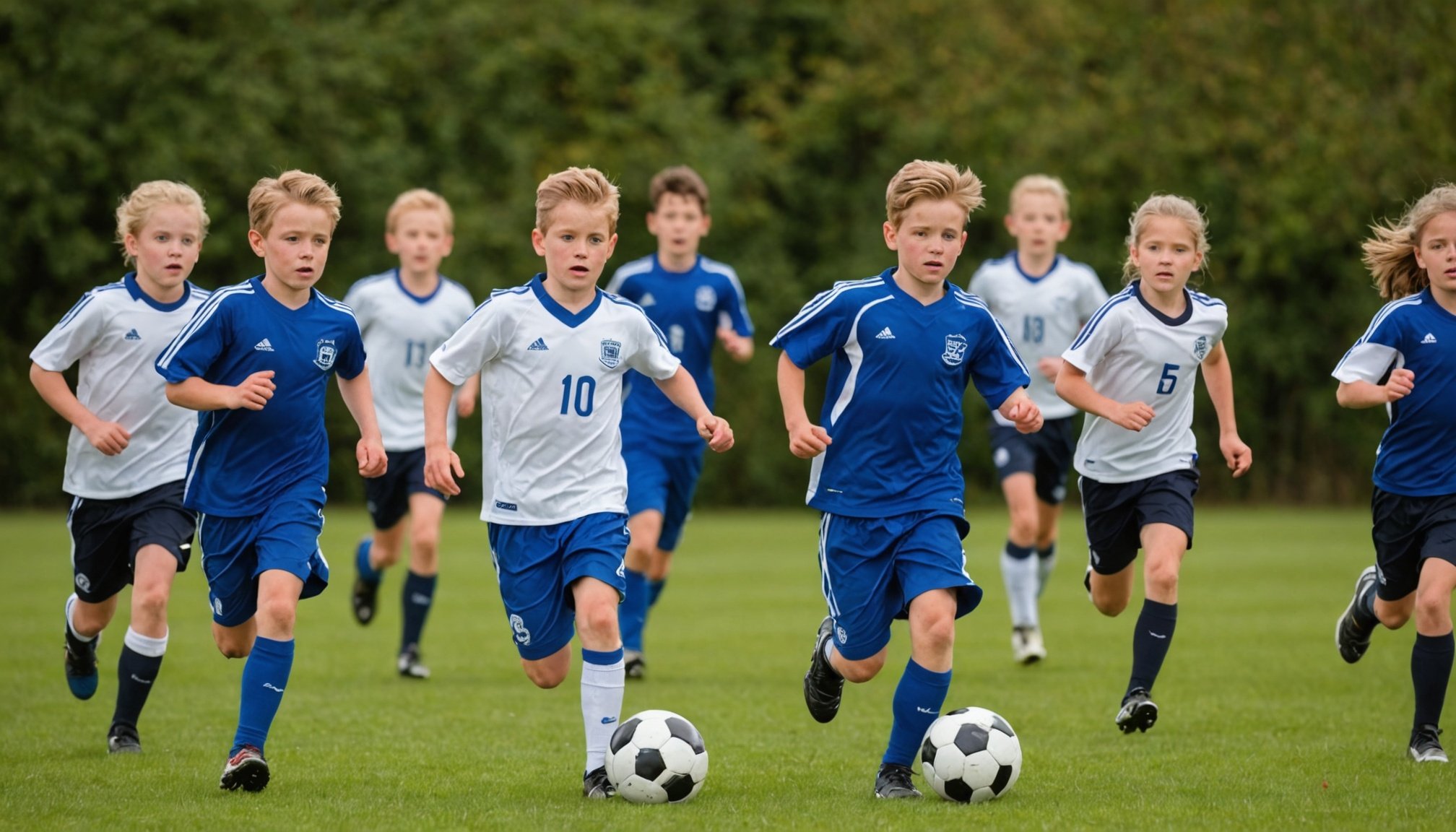In the vibrant world of sports, where dreams of becoming the next elite athlete take root early, many young enthusiasts in the UK face a pivotal decision: when is the right time to specialize? Over the years, discussions around early specialization have garnered attention, raising questions about its impact on the development of young athletes. As their scholar journeys intertwine with their athletic aspirations, parents, coaches, and educators navigate the complex landscape of early sports specialization. This article delves into the benefits associated with early specialization, providing insights backed by research from sources like Google Scholar and PubMed. Join us as we explore how focusing on a single sport at a young age can shape the future of aspiring athletes and contribute to their growth and development.
The Path to Elite Performance: Why Specialization Matters
When discussing early specialization in sports, one cannot ignore its potential to propel young athletes toward elite performance. Specialization involves dedicating time and effort to one sport, often at the exclusion of others, with the aim of achieving excellence. This journey is not without its critics, but proponents highlight several benefits that cannot be overlooked.
Additional reading : How can virtual reality be used as a training tool for UK athletes?
Young athletes who specialize early have the advantage of honing their skills and techniques to a fine edge. The discipline required to commit to a single sport fosters a deep understanding of the game’s nuances. This specialized knowledge can be instrumental in navigating the complexities of competitive sports, allowing children to perform at higher levels compared to their multi-sport peers.
Moreover, early specialization often correlates with increased opportunities for exposure. In the UK, where sports such as football, rugby, and athletics dominate the school and club circuits, being part of specialized clubs or teams can offer greater visibility. This exposure not only boosts an athlete’s profile but also increases the chances of receiving scholarships or being scouted by professional teams.
Also read : How can parents support their children’s aspirations in sports without creating pressure?
Additionally, specialization may instill a sense of identity and purpose in young athletes. As they immerse themselves in a sport, they often develop traits such as resilience, discipline, and a strong work ethic — qualities that are transferrable to other areas of life. For many, the sport becomes a defining aspect of their identity, offering a sense of belonging and community.
While the debate about the right age for specialization continues, focusing one’s efforts early can certainly lay the groundwork for reaching elite levels in the sporting arena.
Holistic Development through Structured Training
It’s easy to perceive early specialization as a narrow path, but in the broader context, it can promote holistic development. By engaging in a structured and consistent training regimen, young athletes often experience physical, mental, and emotional growth.
At a physical level, specialized training can enhance strength, agility, and coordination. As children dedicate their formative years to mastering sport-specific skills, they develop fine motor skills and muscle memory. This focused approach can lead to superior physical conditioning, preparing them for the rigors of competitive sports. The key here is balancing intensity with rest, ensuring that training programs are age-appropriate and diverse in techniques to avoid burnout.
Mentally, early specialization encourages athletes to cultivate focus and strategic thinking. Athletes learn to set and pursue goals diligently, an essential skill both on and off the field. As they navigate challenges, they develop problem-solving abilities and resilience, equipping them for future endeavors.
Emotionally, the environment fostered through early specialization often emphasizes teamwork and camaraderie. Being part of a committed team or training group offers a supportive network, helping children to build self-esteem and confidence. The sense of achievement from reaching milestones in their sport can be profoundly satisfying, reinforcing a positive self-image.
Therefore, while specialization might seem limiting at first glance, it often nurtures broader development, enabling young athletes to excel in multiple dimensions of their lives.
The Role of Schools and Coaches in Early Specialization
Schools and coaches play a pivotal role in guiding young athletes through the journey of early specialization. As key influencers in both the academic and athletic realms, they have the responsibility to nurture talent while ensuring the well-being of their pupils.
Educational institutions in the UK often offer specialized sports programs, integrating intensive training with scholastic pursuits. These programs can provide a balanced environment where students can focus on their chosen sport without sacrificing their academic goals. By emphasizing a comprehensive approach to education, schools help maintain a healthy balance between athletics and academics, ensuring that athletes are well-rounded individuals.
Coaches, on the other hand, are instrumental in shaping an athlete’s development. They have the expertise to design training programs that maximize an athlete’s potential while minimizing the risk of burnout or injury. Through personalized attention and mentorship, coaches can foster a supportive environment that encourages growth and resilience.
However, the role of coaches extends beyond physical training. They serve as role models, imparting life skills and values such as teamwork, perseverance, and sportsmanship. By prioritizing an athlete’s holistic development, coaches ensure that young athletes are prepared for the challenges both within and beyond the sporting world.
In essence, the combined efforts of schools and coaches ensure that early specialization is not just about honing athletic prowess but also about fostering a nurturing environment where young athletes can thrive.
Weighing the Pros and Cons: Making an Informed Decision
As parents, educators, and coaches, the decision to encourage early specialization in sports warrants careful consideration. While the benefits are enticing, it’s crucial to weigh them against potential drawbacks. Understanding both sides of the coin can guide stakeholders in making informed decisions that are in the best interest of the young athlete.
One significant concern is the risk of burnout. Engaging in a single sport year-round can lead to physical and mental exhaustion, reducing the enjoyment and motivation to continue. It’s essential to monitor the athlete’s well-being and incorporate periods of rest and cross-training to maintain enthusiasm.
Moreover, specializing too early can limit the athlete’s exposure to different sports, potentially hindering the development of a well-rounded skill set. Participating in multiple sports can enhance overall athleticism, providing a broader range of experiences and skills.
Injury risk is another factor to consider. Repetitive strain from focusing on specific movements can increase the likelihood of injuries. Implementing preventive measures, such as strength training and flexibility exercises, can help mitigate this risk.
Ultimately, the choice to specialize early should be an informed one, taking into account the athlete’s interests, abilities, and long-term goals. Encouraging open communication among parents, coaches, and young athletes can ensure that the decision is mutually beneficial, prioritizing the child’s holistic development and well-being.
By acknowledging the pros and cons, stakeholders can craft a balanced approach that maximizes the benefits of early specialization while minimizing potential downsides.
The journey of early specialization in sports is complex and multifaceted, offering both promising benefits and noteworthy challenges. For young athletes in the UK, this path can lead to elite performance, holistic development, and a deep connection to their chosen sport. However, it is crucial to navigate this journey with caution, ensuring that the decision to specialize is made collaboratively and with the athlete’s best interests at heart.
As stakeholders weigh the advantages against potential pitfalls, maintaining a balanced approach becomes imperative. By fostering open communication, providing diverse experiences, and ensuring comprehensive support systems, young athletes can thrive both in their sport and personal lives.
Ultimately, early specialization is not a one-size-fits-all solution. It requires a nuanced understanding of each athlete’s unique needs and aspirations. By prioritizing holistic development and well-being, the decision to specialize early can be a rewarding choice, setting the stage for a lifelong love of sports and personal growth.











